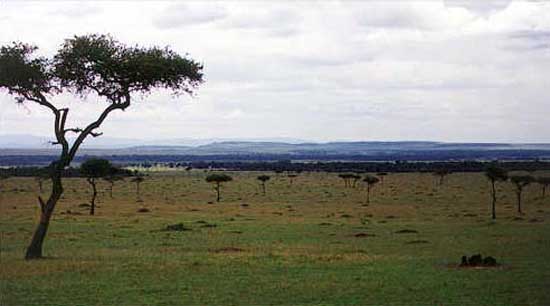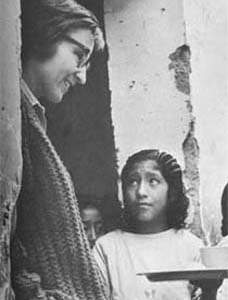
1413,36~115~2844192,00.html, Kelly Hughes serves in a rural village about two hours away from the town of Machakos, Kenya. When she arrived, she admits she was overwhelmed. The region is parched by the sun and the intense heat. Even during the rainy season, the rains seldom come. The crops - mostly maize and beans - are thin and inadequate. Hunger and malnutrition are widespread. The people have little access to education.
CU grad a lifeline for Kenyans
By Diane Carman
Denver Post Columnist
It's one thing to debate the concept of life in a church, a legislature or a living room over a cup of coffee with maybe a slice of fresh canteloupe and some warm toast with raspberry jam.
The issues are so simple: All life is precious. Respect life. Error on the side of life. Isn't life wonderful? Sure, I'll take a second cup. Here's to life.
In the stone shelter with the tin roof and the concrete floor that Kelly Hughes calls home, there's no canteloupe, no warm toast and no time for platitudes.
Death has the upper hand here.
Hughes, a Cherry Creek High graduate who got her bachelor of arts degree from the University of Colorado at Boulder in 2002, celebrates life every day with information, education and condoms - lots of condoms.
She lives in a rural village about two hours away from the town of Machakos, Kenya. She's a Peace Corps volunteer. She's 24.
When she arrived, she admits she was overwhelmed. The region is parched by the sun and the intense heat. Even during the rainy season, the rains seldom come. The crops - mostly maize and beans - are thin and inadequate. Hunger and malnutrition are widespread. The people have little access to education.
And HIV/AIDS is rampant.
"Upon my arrival, I started to realize that people didn't know what HIV and AIDS were," Hughes said over the cellphone of the Peace Corps Kenya director, Robert Wurmstedt (who, coincidentally, is also from Denver). "Most people believed it was some form of witchcraft. They thought they were dying from curses."
Gradually, she began to earn the villagers' trust, and after a few months, she began teaching them about AIDS. It was a virus, she told them, like a tiny germ in their blood, and they could prevent it.
But generations of culture and traditions would have to be confronted.
"Polygamy is a widely practiced thing here," she said. "Within the tribe I've been with, men with three or four wives are fairly common. Men have many partners ... and rape is not a crime."
The spread of HIV in Kenya is mostly the result of unprotected heterosexual sex, she explained, and hard as it was to discuss that with the shy people in her village, it was the only way to save them.
Once enough of the villagers understood and trusted her, the next step was to provide the services required to reduce the spread of the disease. So Hughes began working to establish an AIDS testing and counseling center in her village.
To those of us gazing at the tulips outside the window, that may not seem like much. But keep in mind this is a place where there is no electricity. People fetch their water from a well that is little more than a hole in the ground. They share a pit latrine. And for years the doctors reported AIDS deaths as malaria to protect families from the stigma of what they believed was an evil curse.
A few weeks ago on the day the center opened, William M. Bellamy, the U.S. ambassador to Kenya, came to thank Hughes. Several members of the Kenyan parliament, the assistant minister of health and more than 300 others gathered in the tiny village for the celebration. There were speeches, and the village honored her with dancing, drumming and song.
Of the first 60 clients, 12 or 13 tested HIV positive. They were given vitamins and nutritional counseling, instruction on safe sex and condoms. Someday, Hughes said, they hope to be able to provide antiretroviral medications.
Hughes is happy with what she has accomplished. "It was very difficult," she said. "I really struggled with the challenges. I wondered at first how I could possibly make a difference.
"Now I'm satisfied with how it's turned out, and I wonder what it will be like to be at home having such an excess of everything." Things like hot showers and air conditioning.
And the luxury of debating the meaning of life once you have come to appreciate what it means to really live.
Diane Carman's column appears Sunday, Tuesday and Thursday. She can be reached at 303-820-1489 or dcarman@denverpost.com .









